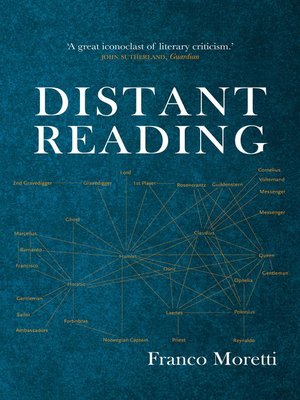
Sign up to save your library
With an OverDrive account, you can save your favorite libraries for at-a-glance information about availability. Find out more about OverDrive accounts.
Find this title in Libby, the library reading app by OverDrive.



Search for a digital library with this title
Title found at these libraries:
| Library Name | Distance |
|---|---|
| Loading... |
WINNER OF THE NATIONAL BOOK CRITICS CIRCLE AWARD
How does a literary historian end up thinking in terms of z-scores, principal component analysis, and clustering coefficients? The essays in Distant Reading led to a new and often contested paradigm of literary analysis. In presenting them here Franco Moretti reconstructs his intellectual trajectory, the theoretical influences over his work, and explores the polemics that have often developed around his positions.
From the evolutionary model of “Modern European Literature,” through the geo-cultural insights of “Conjectures of World Literature” and “Planet Hollywood,” to the quantitative findings of “Style, inc.” and the abstract patterns of “Network Theory, Plot Analysis,” the book follows two decades of conceptual development, organizing them around the metaphor of “distant reading,” that has come to define—well beyond the wildest expectations of its author—a growing field of unorthodox literary studies.
How does a literary historian end up thinking in terms of z-scores, principal component analysis, and clustering coefficients? The essays in Distant Reading led to a new and often contested paradigm of literary analysis. In presenting them here Franco Moretti reconstructs his intellectual trajectory, the theoretical influences over his work, and explores the polemics that have often developed around his positions.
From the evolutionary model of “Modern European Literature,” through the geo-cultural insights of “Conjectures of World Literature” and “Planet Hollywood,” to the quantitative findings of “Style, inc.” and the abstract patterns of “Network Theory, Plot Analysis,” the book follows two decades of conceptual development, organizing them around the metaphor of “distant reading,” that has come to define—well beyond the wildest expectations of its author—a growing field of unorthodox literary studies.







